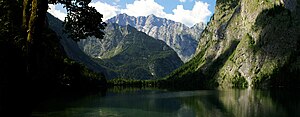Portal:Bavaria
Bavaria


Bavaria, officially the Free State of Bavaria, is a state in the southeast of Germany. With an area of 70,550.19 km2 (27,239.58 sq mi), it is the largest German state by land area, comprising roughly a fifth of the total land area of Germany. With over 13 million inhabitants, it is the second most populous German state behind North Rhine-Westphalia, but due to its large physical size its population density is below the German average. Major cities include Munich (its capital and largest city, which is also the third largest city in Germany), Nuremberg, and Augsburg.
The history of Bavaria includes its earliest settlement by Iron Age Celtic tribes, followed by the conquests of the Roman Empire in the 1st century BC, when the territory was incorporated into the provinces of Raetia and Noricum. It became the Duchy of Bavaria (a stem duchy) in the 6th century AD following the collapse of the Western Roman Empire. It was later incorporated into the Holy Roman Empire, became the independent Kingdom of Bavaria after 1806, joined the Prussian-led German Empire in 1871 while retaining its title of kingdom, and finally became a state of the Federal Republic of Germany in 1949.
Bavaria has a distinct culture, largely because of its Catholic heritage and conservative traditions, which includes a language, cuisine, architecture, festivals and elements of Alpine symbolism. It also has the second-largest economy among the German states by GDP figures, giving it the status of a wealthy German region.
Contemporary Bavaria also includes parts of the historical regions of Franconia and Swabia, in addition to Altbayern. (Full article...)
Selected article

The Kingdom of Bavaria (German: Königreich Bayern; Bavarian: Kinereich Bayern; spelled Baiern until 1825) was a German state that succeeded the former Electorate of Bavaria in 1806 and continued to exist until 1918. With the unification of Germany into the German Empire in 1871, the kingdom became a federated state of the new empire and was second in size, power, and wealth only to the leading state, the Kingdom of Prussia.
The polity's foundation dates back to the ascension of Elector Maximilian IV Joseph of the House of Wittelsbach as King of Bavaria in 1806. The crown continued to be held by the Wittelsbachs until the kingdom came to an end in 1918. Most of the border of modern Germany's Free State of Bavaria were established after 1814 with the Treaty of Paris, in which the Kingdom of Bavaria ceded Tyrol and Vorarlberg to the Austrian Empire while receiving Aschaffenburg and Würzburg. (Full article...)
Selected biography

Richard Georg Strauss (11 June 1864 – 8 September 1949) was a German composer of the late Romantic and early modern eras, particularly of operas, Lieder and tone poems. Strauss was also a prominent conductor.
Strauss was born on 11 June 1864, in Munich, the son of Franz Strauss, who was the principal horn player at the Court Opera in Munich. He received a thorough, but conservative, musical education from his father in his youth, writing his first music at the age of six. He continued to write music almost until his death.Quotes
- Home is not where you live, but where they understand you.
Christian Morgenstern (poet)
- So certainly, if we can tell evil stories to make people sick, we can also tell good stories that make them well.
Rainer Werner Fassbinder (film director)
- Hopefully it won't be worse than it is already.
Selected image

Did you know?

- ...that there is a Bavarian citizenship (as opposed to a German citizenship)? Actually, the Bavarian constitution (Bavaria has a separate constitution that exists alongside the German constitution) explicitly provides for it in articles 6 and 7. Specifically, you become a Bavarian citizen by birth, by marriage or by being naturalized.
Subcategories
Topics
Related portals
Germany state portals
WikiProjects
Things to do

- Requested articles:
- Help assess articles supported by WikiProject Bavaria
- Help suggest content for usage in this portal by using the archive links to obtain instructions
- Write Bavarian topics if you see a redlink which is worthy of an article
- Cleanup and expand stub-class articles relating to Bavaria
Wikipedia in Bavarian languages
Associated Wikimedia
The following Wikimedia Foundation sister projects provide more on this subject:
-
Commons
Free media repository -
Wikibooks
Free textbooks and manuals -
Wikidata
Free knowledge base -
Wikinews
Free-content news -
Wikiquote
Collection of quotations -
Wikisource
Free-content library -
Wikiversity
Free learning tools -
Wikivoyage
Free travel guide -
Wiktionary
Dictionary and thesaurus










